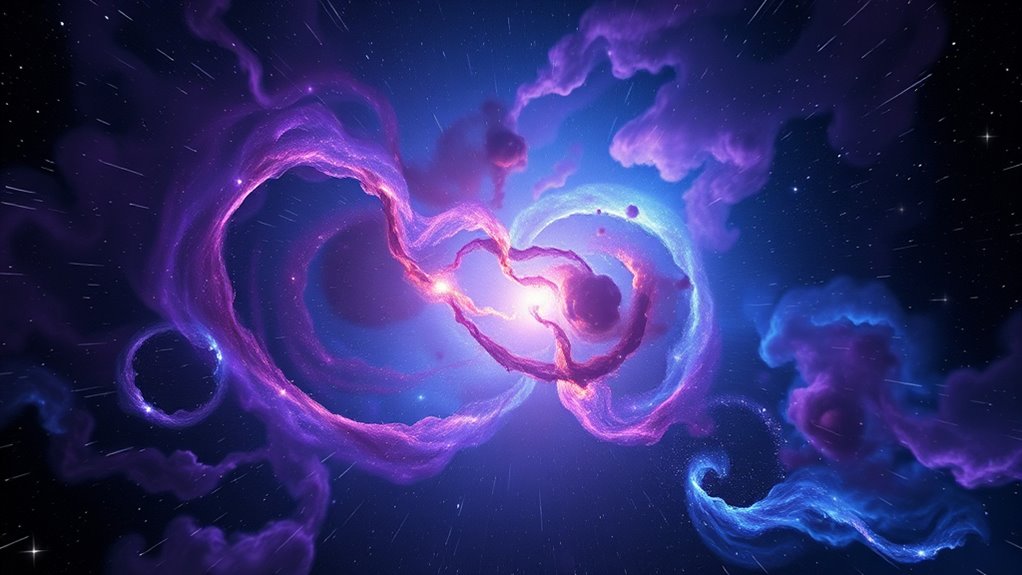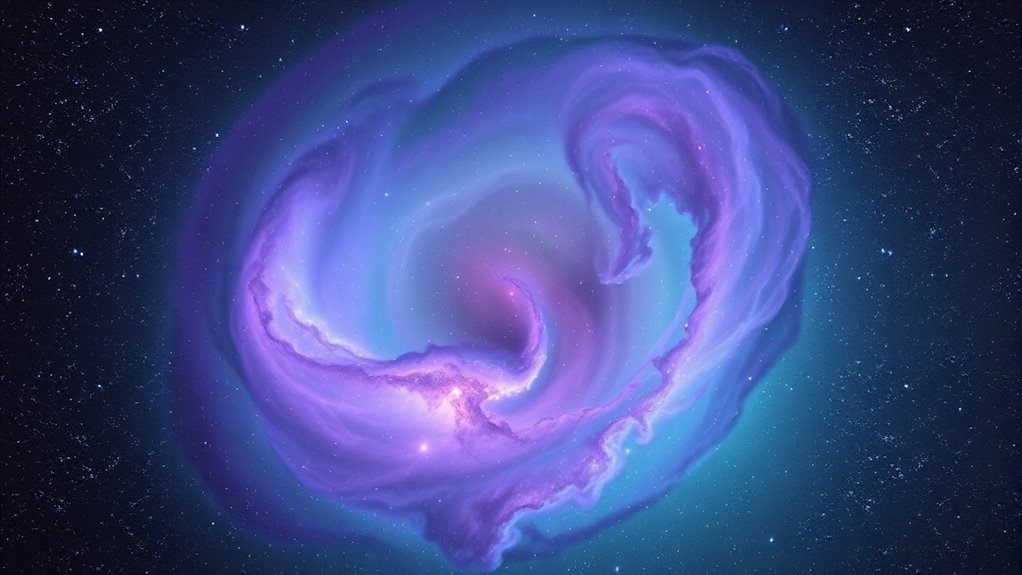Dark energy is a mysterious force causing the universe to expand faster over time. It makes up about 68% of the cosmos and acts like a repulsive push on space itself. Scientists think it might be linked to the cosmological constant, related to vacuum energy from quantum fluctuations. Although its true nature remains unclear, understanding it could reveal the universe’s future. Keep exploring to uncover more about this fascinating cosmic mystery.
Key Takeaways
- Dark energy is a mysterious force driving the universe’s accelerated expansion.
- It constitutes about 68% of the universe’s total energy content.
- The cosmological constant, linked to vacuum energy, models dark energy’s effects.
- Quantum fluctuations in empty space contribute to vacuum energy, influencing cosmic growth.
- Ongoing research aims to understand dark energy’s true nature and its role in the universe’s fate.

Have you ever wondered what’s causing the universe to expand at an accelerating rate? It’s a question that has puzzled scientists for decades, and the answer lies in a mysterious force called dark energy. While it makes up about 68% of the universe, its true nature remains elusive. One of the key ideas to explain this acceleration involves the concept of the cosmological constant, a term Einstein originally introduced to his equations of general relativity. The cosmological constant acts like a repulsive force, pushing space apart and speeding up the universe’s expansion. But what’s fueling this force? That’s where vacuum energy comes into play.
Vacuum energy refers to the energy present in empty space—the so-called quantum fluctuations that constantly occur at the smallest scales. According to quantum field theory, even in a perfect vacuum, particles and antiparticles pop into and out of existence, creating a baseline energy. This energy isn’t just theoretical; it has measurable effects on the fabric of spacetime. In fact, the cosmological constant can be thought of as a manifestation of this vacuum energy, exerting a uniform pressure that causes space to stretch faster over time. The intriguing part is that, although vacuum energy is predicted to be enormous in magnitude, observations suggest its actual influence on cosmic expansion is tiny but persistent enough to drive the acceleration we see today.
Vacuum energy, a quantum fluctuation in empty space, drives the universe’s accelerated expansion despite its tiny observed effect.
Understanding the relationship between the cosmological constant and vacuum energy helps clarify why the universe is expanding so rapidly. If vacuum energy is indeed responsible for the cosmological constant, then the quantum properties of space itself are shaping the cosmos on the largest scales. This realization links the very small—quantum physics—to the very large—cosmology—highlighting the interconnectedness of all physical phenomena. Yet, the precise value of the cosmological constant remains a mystery, and scientists continue to debate why the vacuum energy’s effects aren’t astronomically larger than what we observe. Quantum fluctuations play a crucial role in these processes, connecting the quantum world to the vast cosmos.
In essence, the cosmological constant, driven by vacuum energy, provides a way to understand dark energy’s role in the universe’s expansion. It’s a force that, although rooted in the bizarre world of quantum mechanics, influences the universe on a grand scale, accelerating its growth and challenging our understanding of the cosmos. As research progresses, unraveling this connection could unleash the secrets behind dark energy’s true nature and the ultimate fate of the universe.
Frequently Asked Questions
Can Dark Energy Be Harnessed or Used for Practical Purposes?
You might wonder if dark energy can be harnessed for practical uses. Right now, scientists haven’t found a way to do energy harvesting from dark energy, and its nature makes technological applications unlikely in the near future. If we could find a way to tap into dark energy, it could revolutionize energy sources, but for now, it remains a fascinating cosmic mystery without real-world applications.
Does Dark Energy Exist Beyond Our Observable Universe?
Imagine a vast, endless ocean where waves stretch beyond what you can see. Does dark energy exist beyond our observable universe? Scientists think so, hinting at multiverse implications and cosmic inflation. If dark energy extends beyond our horizon, it suggests a universe much larger and more complex than we imagine, constantly expanding into the unknown. This ongoing mystery fuels our curiosity about what lies beyond what we can currently observe.
Could Dark Energy Explain Other Cosmic Phenomena?
You wonder if dark energy could explain other cosmic phenomena. Dark energy drives cosmic expansion, so it might influence things like galaxy formation or the universe‘s overall structure. While its primary role is in accelerating expansion, scientists are exploring whether dark energy interacts with matter or impacts cosmic microwave background patterns. Understanding dark energy better could reveal its broader effects, helping us grasp the universe’s evolution and the nature of cosmic phenomena.
Are There Alternative Theories to Dark Energy?
You might think dark energy’s the only game in town, but alternative theories like modified gravity and quintessence models challenge that idea. Ironically, these theories aim to explain cosmic acceleration without invoking mysterious forces. You, as a curious observer, should explore how modified gravity tweaks Einstein’s equations, or how quintessence models introduce dynamic fields, offering fresh perspectives—yet still, they’re often met with skepticism and ongoing debate in the scientific community.
How Will Dark Energy Impact the Future of the Universe?
You’re wondering about dark energy implications for the universe’s future. As it drives cosmic expansion, it causes galaxies to drift apart faster over time. This accelerated expansion could lead to a “Big Freeze,” where stars burn out and the universe becomes cold and dark. Understanding dark energy helps you grasp how the universe might evolve, emphasizing the importance of studying this mysterious force to predict cosmic destiny accurately.
Conclusion
You now see how dark energy acts like an invisible hand guiding the universe’s expansion. It’s the mysterious force pushing everything apart, much like a cosmic wind that never ceases. As scientists continue to explore this enigma, remember that dark energy is the universe’s silent artist, shaping its future in ways we’re only beginning to understand. The more we learn, the more we realize we’re gazing into the universe’s deepest, most elusive secrets.










